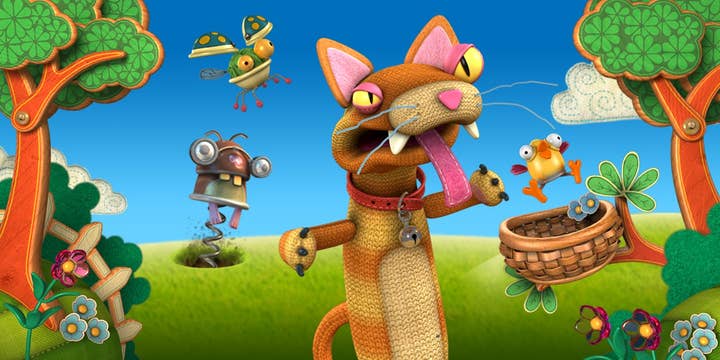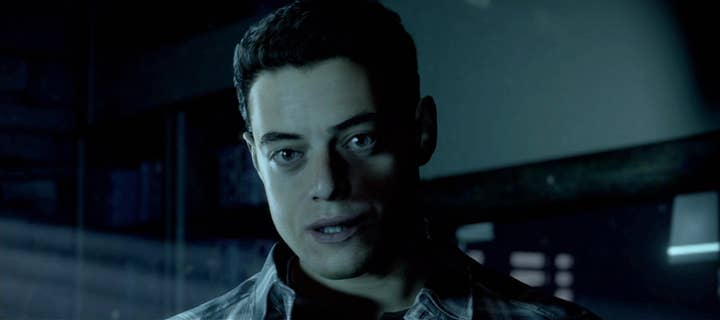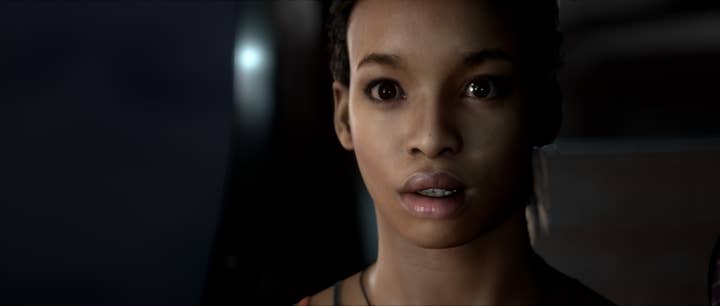Supermassive Games: "We used to think awards didn't matter"
On its tenth birthday, we ask the UK studio about its history and what its Dark Pictures Anthology says about the future
The birth of Supermassive Games was opportunistic.
The Until Dawn studio was created when industry veterans Pete and Joe Samuels were approached by Sony to create launch titles for the PlayStation Move. The company they constructed worked on two games: Start The Party and Tumble. The idea at the time was that this Supermassive team would be, first and foremost, a business.
"I remember when we set the studio up, and we were talking to people about bringing them on board. And I made this statement that awards didn't matter," remembers Pete Samuels. "I said that this was a business, and what matters was business success in traditional terms.

"I think my view on that has turned 180 degrees since then. Because recognition by a community, whether it's your peers or the gaming community... that validation that what you're doing is being enjoyed, is actually massive. And as a studio, that has become more of a driver for us; to do great things that will be remembered.
"When people talk about us, generally, they talk about us as the 'Until Dawn studio'. And that's great. Until Dawn was released three years ago, and our ambition is that next year people are talking about us as the Dark Pictures studio."
The Dark Pictures Anthology is Supermassive's next major project. It's a wholly owned IP and the developer's most ambitious concept so far, with the majority of the 170-person studio working on it.
Yet the ten year journey to this point has been long and not especially easy. From developing Move games with little more than a ping-pong ball taped to a toilet roll, to being one of the lead developers on almost all of Sony's more experimental technology -- including Wonderbook, VR and Playlink. In fact, Supermassive has developed a reputation as being a go-to developer for emerging video game tech.
"Every time we don't get the results that we wanted, it is responsible to do some soul searching"
"There's two sides to it," Samuels tells us. "There is publishers recognising that there's a talented bunch of people here that get their heads around new tech, and are flexible in terms of understanding what the needs of a project are. If the objective is to serve new hardware, then you have to work closely with the hardware owner. We've proved we've done that well.
"But also, we like new stuff. That's partly because we're geeks and we're interested in where tech's going. And it is partly a deliberate business approach that says you never know what is going to stick... so to get in early with new technology is always a good idea as long as it isn't putting your company at risk and the stakes aren't too high."
Although it's developed numerous games for Sony technology, Supermassive is best known for the BAFTA award winning Until Dawn. The cult favourite horror title won plaudits for its narrative and overall performance, and it has resulted in the studio doubling-down on storytelling.

However, its first attempt at telling stories through games didn't go according to plan. Supermassive partnered with the BBC on what was meant to be a series of Doctor Who games. The first title, named The Eternity Clock, launched in 2012 and was critically panned. No sequels were made.
"Over a ten year period there have been a few moments like that -- some more recently," Samuels admits, referring to the recent disappointment of the PlayStation VR game Bravo Team. "Every time we do something and we don't get the results that we wanted, it is responsible to do some soul searching, and understand why that happened, how it happened, how much of it is our fault... We can only deal with the parts of it that are down to us, but we are responsible for doing that.
"I think we have quite an open culture, certainly nowadays, where we all face those things head on. We have made some changes recently to make sure that, as big as we're getting, we still have as open a culture as possible. We don't always succeed in maintaining a small business mentality in what is now quite a large business, but we always try to.

"There have been a few of those moments - those wake up calls - along the way. They're often born out of pain, it's fair to say, but certainly not something to fear. I would hate for us to be in a situation where we stopped taking risks because we were frightened of the consequences. We just need to look forward to the next time we have a wake up call, because we get better for it."
Samuels believes Until Dawn is a better game because of The Eternity Clock. And Until Dawn also had a transformative effect on Supermassive.
"It changed things massively," he says. "Again, there were difficulties in the project from time to time, but it was generally a very positive thing. We expected it to be successful, but we were blown away by the response. Certainly from the fandom that grew around it.
"It was different and maybe there was more difference in it than we initially saw. The feeling of being nominated for four BAFTAs, never mind collecting one on behalf of the team, was phenomenal. It was a massive moment for us, and we took lessons from that. We looked at what we did right and moved it forward into what we're doing now."
What Supermassive has done since Until Dawn hasn't always hit the mark, but each project has merged the studio's love of the experimental with its knack for telling stories. Earlier this year it put out the narrative VR experience The Inpatient, and last year it used Sony's Playlink to tell a mystery story through a party game called Hidden Agenda.
"There is a legacy of Until Dawn in everything that we do now. But it would be dangerous if we decided to follow that formula indefinitely"
"There is a legacy of Until Dawn in everything that we do now. But it would be dangerous if we decided to follow that formula indefinitely," Samuels says.
That leads nicely into The Dark Pictures, a new series of video game shorts that the studio is releasing through Bandai Namco (which sees Supermassive developing for Xbox for the first time). The Dark Pictures is an anthology series of horror games, with the first story - Man of Medan - due next year.
"After we released Until Dawn, while the majority of the press that it got was very positive, we also read all of the negative stuff," Samuels says. "And there was some; the genre isn't everybody's cup of tea. We did a really detailed analysis of what was mainly commentated on well and what things were brought up as issues for people. We had a massive spreadsheet analysis.
"We weren't sure if anything would come out of it, but a bunch of things did, which drove us down the route of shorter stories. Then we looked at how we would do that, and what the strengths of smaller stories would be... For us, one of the strengths was that we could tell more stories. We loved that idea. We loved developing the stories and the characters, and we could do that multiple times in the same period if we did an anthology.
"Then there is also a commitment to people about having good stories, good characters and the chance to surprise people each time. So we went away and figured out if that was something we could commit to. After a few prototypes and a few drafts, we decided that we could do that.
"And we think people will like it. Certainly horror fans, who have often been fans of shorter format, anthology-type approaches. There is a place for it, a model for it in other media, it just hasn't been done in games. That was another reason to do it."

Trying something completely new, in the notoriously risky world of not-quite-AAA single-player video games, is a brave move. Yet Samuels says Supermassive has always spread its bets, and with the support of companies like Bandai Namco and Sony he's unfazed by the potential challenges.
"We have our segment of the market," he begins. "We are always looking at accessibility. We are looking at how people can enjoy these games together, even with people who wouldn't necessarily go out and buy games. It is one of the things that struck us with Until Dawn. Watching how people played Until Dawn together on YouTube... It was a real eye-opener for us about an appeal that we can build into what we do.
"If we are not doing things now to prepare ourselves for two or three years time, we probably won't be here in four years"
"We have conversations all the time with publishers to see whether that is part of the market that they're interested in. Good partners are really important for a business of our size. We'd be lost, we wouldn't be here, without the partners that we work with.
"As long as we can find a publisher for everything we do, which shares the passion that we have for it, then we are fine. We put a lot of trust, rightly so, in a publisher. That is what they are there for. They know things that we don't. We have no aspiration to be a significant publisher. We make games. That's what we do, we are very happy with that, so we need that expertise and we take guidance.
"It seems pointless to partner with somebody that is massively successful, with massive expertise, and then completely ignore what advice they are giving you."
Supermassive has other unannounced projects in the works. Samuels wouldn't be drawn into whether VR is a part of its future (the firm has released four VR games so far), but says he believes the technology will eventually take off -- "It'll just take twice as long and be half as big as analysts expect," he jokes.
And the company is constantly looking at whatever the next new thing might be.
"It's going to be interesting to see how streaming develops," Samuels says. "Bigger players are backing it now. Connection speeds are not going to get slower. Also, people's familiarity with using [streaming] in other media -- through Netflix and Amazon and so on -- is increasing. It is becoming less scary for people to not own a physical copy."
He concludes: "What a next generation console is going to look like is on our minds at the moment, too. In a sense, what is the Dark Pictures going to look like in two or three years? What are the platforms that it's on going to be like?
"Because two or three years isn't a long time in our business. If we are not doing things now to prepare ourselves for two or three years time, we probably won't be here in four years."








